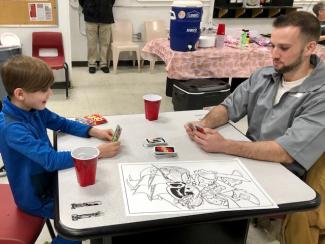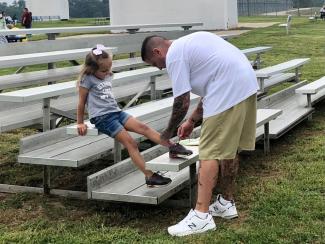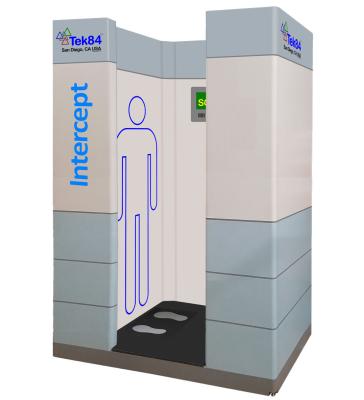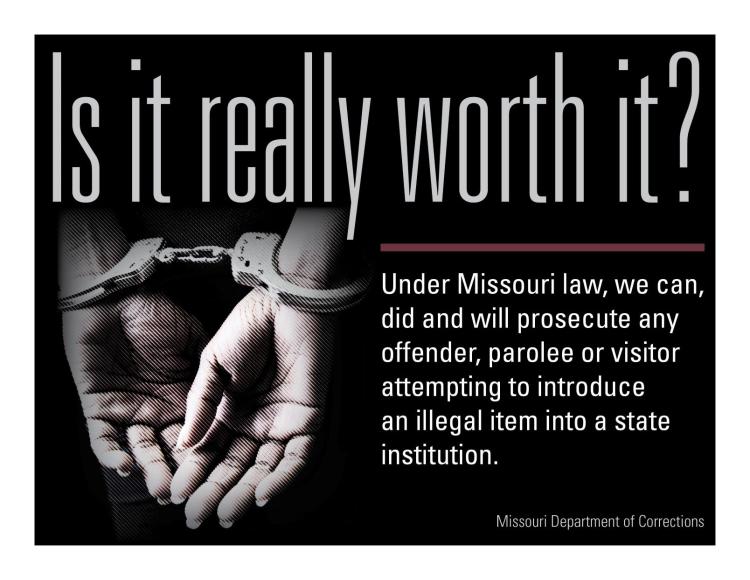
Visiting is an important part of the rehabilitation process in Missouri state prisons. Visits help to strengthen family bonds and keep incarcerated people connected with loved ones. Please follow the visiting rules carefully to avoid disruptions.
Visiting Process and Requirements
You must be pre-approved to visit. To be considered for visiting, please complete the visiting application thoroughly and honestly, using the instructions provided. A criminal history check will be conducted. Failure to be honest and transparent may result in denial of visiting privileges.

Visitor Application Instructions
- Offender will be notified of visiting approval
- Offender is responsible for notifying the visitor
Who can apply to visit an offender?
- Immediate family: spouse, legal guardian, parents, in-laws, siblings, children, grandparents, great-grandparents, grandchildren, great-grandchildren
- Extended family: uncles, aunts, cousins
- Significant other
- Friends
- Clergy
Visitors may visit only one offender unless the visitor is an immediate family member of more than one offender.
Once approved or denied to visit:
- Offender will be notified
- Offender is responsible for notifying the visitor
- If the visiting application is denied, an appeal letter may be sent by the applicant within 30 days to:
Missouri Department of Corrections
Attn: Deputy Division Director of Adult Institutions
2729 Plaza Drive, PO Box 236
Jefferson City, MO 65102
A thorough review of all information will be made and the final decision sent to the visitor, in writing. Visitors who are denied may reapply for visiting status after one year.

Plan Your Visit
Confirm offender’s location and status to visit. Check the visit schedule and directions to the facility and learn if video visits are available at the facility.
The number, length and schedule of visits vary by facility because of different capacities to host visiting. Weekends may be designated for immediate family members only (spouse, children, parents, brothers or sisters, grandparents and step relations) or one individual of choice (a significant/designated other, such as a close friend).
A visit shall be limited to 3 visitors per offender and may include up to 3 additional visitors who are age 5 and under.
Visiting restrictions, such as number of visitors permitted at one time, length of visit, etc, may be imposed as needed due to inclement weather, limitation of the visiting room facilities or staff member or other safety and security concerns.
Offenders on reception and orientation status may receive only one visit per month while awaiting assignment to a permanent institution or treatment center.
Be Prepared for Your Visit
Be familiar with visiting rules, regulations and procedures before you visit. You will be required to follow them. Rules are available upon request from the facility and are posted in the visiting room.
Arrival at the Facility
Visitors may arrive in the parking lot no earlier than 30 minutes before visiting starts. Visitors will enter the facility on a first-come first-served basis. No person or pet may remain in the vehicle on institutional grounds.
Required Identification

- Adult visitors: valid photo ID, such as current driver’s license or Department of Revenue ID card
- Visitors age 13-18: a current school photo ID card that includes their name or a valid federal or state government-issued ID card
Allowed Items
- Coins in clear sandwich bag or transparent plastic pouch for use in vending machines.
- Specific medical supplies: Medications or medical equipment needed to maintain life, such as nitroglycerin, insulin and insulin supplies, oxygen or asthma inhalers in the original container, only in the necessary dosage for the visiting period.
- Notice should be made in advance to the case manager to ensure staff are aware of your needs
- Notify staff upon your arrival of the need for medication during visitation.
- If you have special medical equipment, such as a walker, wheelchair or surgically implanted metal hardware, please provide a physician’s statement.
- Infant supplies: one clear carry-all, 6 diapers, 1 blanket, 3 clear plastic bottles of prepared infant beverage, 1 clear plastic no-spill toddler cup, 3 unopened vendor containers of baby food, 1 plastic pacifier, teether and/or rattle, 1 small plastic spoon and 1 unopened package of baby wipes.
Note: Small lockers are available at most institutions to store your purse, wallet or keys.
Search of Visitors
- When you enter prison grounds, you, your packages, your children and your vehicle are subject to search.
- Metal detectors are used at all facilities.
- Itemizer: Visitor is given a towelette to wipe their shirt front, pockets and palms of their hands; it is then placed in machine to detect traces of narcotics or explosives.
Body Scanners
Supporting the effort to safeguard our facilities and protect staff and residents from dangerous contraband, the Missouri Department of Corrections uses body scanners for staff, visitors, vendors, contractors and volunteers entering adult institutions.
The Intercept full-body scanner is used in conjunction with walk-through metal detectors, hand-held metal detectors and X-ray baggage scanners to keep out weapons, drugs and other prohibited items that may compromise safety and security.
How It Works

The name and ID number of each person entering a facility is entered into the body scanner system and stored before the first scan. Visitor ID numbers serve as the scanning ID numbers for visitors. The ID number of a driver’s license, non-driver’s license or passport will be used for all other non-staff members.
Before a person steps into the full-body scanner, the device takes a photograph that is stored within the body scanner system.
The person being scanned stands inside the Intercept and remains motionless as the operator initiates a four-second scan. The image displays on the workstation monitor, and the operator inspects the image for concealed objects.
Who May Be Scanned
Anyone 18 or older is subject to a scan using the full-body scanner unless they have an approved exception, such as a verified medical condition or pregnancy. Non-staff members, such as offenders’ visitors, vendors and contractors, may submit a request for an exception to the warden or superintendent of the facility.
Required Dress Code
Prohibited
- Tight or excessively baggy, transparent or revealing clothing
- Gang, racial, inappropriate or inflammatory language or symbols
- Camouflage design
- Skirts, dresses and shorts shorter than the top of the kneecap when standing
- Wrap-around or slit skirts or dresses
- Holes or slits in pants
- Shirts, blouses and tops that do not cover the chest, cleavage, back and stomach or that do not have sleeves that cover the shoulders.
- Headwear except for verified religious purposes; subject to search
Required
- Appropriate undergarments and shoes. Undergarments with wire or metal supports are discouraged due to metal detectors.
Physical Contact Limitations
- One greeting and departing embrace and brief kiss allowed
- Holding hands during visit is allowed
- Children age 6 and under may sit on offender’s lap, unless offender is a sex offender
- Children should be attended by adult visitor at all times
Incentive Food Visits

Some facilities permit the family members and friends of approved visitors to bring outside meals to share during special food visits. The following restrictions may apply:
- Food may be prepared at home or catered by or purchased from a vendor.
- All food must comply with security regulations.
- A total of four containers may be brought for each authorized food visit. Containers for home-prepared or store-bought foods may be no larger than a 9x9x4 and must be constructed of clear plastic only.
- The following items do not count as part of the total container count:
- Loaf of sliced bread or equivalent (biscuits, rolls, etc.)
- Sandwich bags used for lettuce, tomatoes, etc. NOTE: Plastic bags 1 quart or larger will be counted as a container.
- Factory-sealed condiments and/or up to 20 pre-sealed restaurant style condiment packets.
- Food brought from vendors must be in the original container (no glass, metal, aluminum pans or foil).
- In addition to the above four containers, paper, plastic or styrofoam disposable dinnerware and eating utensils are allowed. Disposable dinnerware must be provided by the visitor, not by the offender or facility.
Only the appropriate number of disposable dinnerware can be brought into the institution, and the visitor is responsible to ensure that they transport that same number of items out of the institution when they leave.
The following items may NOT be brought in for food visits:
- Fresh fruit items
- Jell-O or ice cream
- Beverages and/or beverage mixes
- Aerosol containers (i.e. whipped cream and “cheese in a can”)
- Coolers and or ice chests
- Whole cuts of meat (i.e. pot roast), whole birds (i.e. turkey or chicken), shellfish in the shell.
Inspection of food items may include a physical search of the food items that entails cutting, stirring, piercing or separating an item to ensure no contraband is introduced into the facility.
- Staff members conducting the search must wear appropriate gloves and a hair net or cap.
- Any food not easily searched may be denied.
Food may be only consumed by the offender and the visitor and may not be shared with others.
- Leftover food items must be discarded in appropriate receptacles by the visitor after the visit, or removed from the facility with the visitor.
Plan Your Trip
Find out when you can visit, and get directions to the facility.
Visiting is Privilege
Visiting can be suspended, terminated or restricted for:
- Failure to follow visiting rules
- Refusal to submit to search
- Use of alcohol or narcotics
- Inappropriate language
- Improper dress
- Presenting risk to the safety and security of the facility, staff, offenders or visitors
- Participation in illegal activities or violations of Missouri law
If visiting sanctions are imposed on a visitor, the institution will send a written notice outlining the infraction and sanctions imposed. A visitor may appeal restrictions in writing to Missouri Department of Corrections at 2729 Plaza Drive, PO Box 236, Jefferson City, MO 65109.
Contraband

Under Missouri State Statute 217.360, it is a criminal offense for any person entering a correctional facility to bring in drugs, alcoholic beverages, firearms or any other article an offender is not permitted to possess. Doing so may be a felony and can carry a punishment of up to 15 years in prison.
The Missouri Department of Corrections prohibits illegal narcotics as well as substances that may be legal to possess or use outside a correctional setting, such as tobacco, alcohol and cannabis. Violators will be referred for prosecution.
